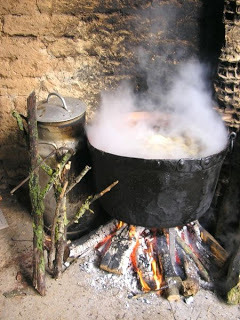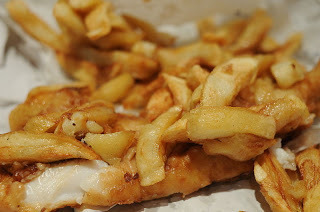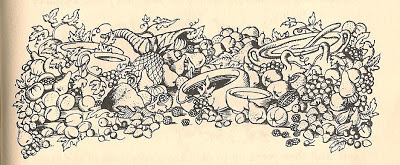Anyone for Stew?
 In 'The Tough Guide to Fantasyland', Diana Wynne Jones warns travellers through that magical land that the only thing they'll ever be offered to eat on their Quest - whether in a Tavern, Alehouse, or Camp - is stew. Unless of course they are being entertained by an Enchantress who intends to seduce them, in which case "jellies soother than the creamy curd,/And lucent syrops, tinct with cinnamon" will be the least of it.
In 'The Tough Guide to Fantasyland', Diana Wynne Jones warns travellers through that magical land that the only thing they'll ever be offered to eat on their Quest - whether in a Tavern, Alehouse, or Camp - is stew. Unless of course they are being entertained by an Enchantress who intends to seduce them, in which case "jellies soother than the creamy curd,/And lucent syrops, tinct with cinnamon" will be the least of it.Stew. She's right, of course. During the effort of creating a coherent fantasy world, authors sometimes just get tired. All the stuff we have to provide for our characters to carry around with them, in order to make it over the mountains, through the forest, and across the desert! Backpacks, ponies, sacks of flour! Do we have to do the cooking for them, too? And so it's easier to picture a cooking pot slung over the flames, with some indeterminate mess bubbling away inside - and throw in a couple of references to snaring rabbits, digging for roots, and hunting. "What the heck, after all," we think, "can you cook in the open air, over an open fire, except stew? Or possibly porridge?"
There's a scene in the movie of the Fellowship of the Ring where Aragorn returns to camp with a dead deer slung over his shoulders. Interesting. Except they'd be moving on next day. You try cutting up a dead deer and sticking it into a cooking pot small enough to hang over a campfire. Or else carting raw meat around with you on a hike. No wonder Tolkien's elves invented lembas - light, portable, nutritious and apparently vegetarian - the culinary equivalent of that useful phosphorescent stuff that appears on the end of wizards' wands (or simply clings to the walls) to light up otherwise lightless caves.
I must hold my hand up here, I think I've occasionally given my own characters stew (and mysterious glowing lights), but I try nowadays to come up with other ideas. In 'Dark Angels', set in the late 12th century, it was fun to reference real medieval dishes, such as blancmange - minced chicken with pounded almonds - for the meals at the high table of La Motte Rouge, Lord Hugo's motte and bailey castle. One character in the book is a highly food-centered house-hob:
The hob yawned, showing a lot of yellow teeth. "What's for supper tonight? Roast pork and crackling?"
"It's Friday," said Nest, wiping her eyes.
"Is it?" The hob's face fell. "No meat," it grumbled. "Fasting on Friday. Who thought that one up? What's the point?"
Nest sat up. "Fasting brings us closer to the angels," she said coldly. "Angels never eat. they spend all their time praising God."
"Only cos they ain't got stummicks," the hob muttered. "Go on then, what's for supper? Herbert's not the worst cook I've ever known. We won't starve. Fish, I s'pose? A nice bit of carp, or trout?"
And in the end, the meal turns out to consist of fish in batter with a sharp sauce, followed by a sweet omelette.
Of course it's easier if you're writing the sort of fantasy which isn't affected - indeed, may even be enhanced - by the mention of anachronistic or otherwise out-of-place types of food. In Hobbiton, the affectionately 'English' area of Middle Earth, no reader is going to mind references to potatoes, fish and chips, buttered toast, birthday cake, et cetera. In 'The Hobbit', Gandalf and the dwarves demand all kinds of food from poor Bilbo, all of it either English, or, like coffee, at least readily available in England:
"Tea? [said Gandalf] No thankyou! A little red wine, I think for me."
"And for me," said Thorin.
"And raspberry jam and apple tart," said Bifur.
"And mince pies and cheese," said Bofur.
"And pork-pie and salad," said Bombur.
"And more cakes - and ale - and coffee, if you don't mind," called the other dwarves through the door.
... "Put on a few eggs, there's a good fellow," Gandalf called... "And just bring out the cold chicken and pickles!"
Much of 'The Hobbit' has a lighter, more frivolous tone than 'The Lord of the Rings' ( and I disliked it as a child; I preferred serious fantasy) - so this stodgy 20th century English menu works well as comedy. But it's impossible, I think, to imagine coffee or tea being offered to guests anywhere in Minas Tirith or Edoras. Even Sam's throwaway remark about fish and chips, to Gollum in Ithilien (in the chapter entitled 'Of Herbs and Stewed Rabbit'), has always made me feel uneasy. Chips? Where have the potatoes come from? Middle Earth is so clearly Early European in its culture/s, that I just feel there shouldn't be potatoes. I can cope with pipe-weed, because Tolkien has (thinly) disguised it. It might not be nicotiana. People smoke all kinds of things. But potatoes? What is Middle Earth's geographical relationship to the Americas?

I'm more comfortable with the frivolous tone in Kenneth Grahame's 'The Wind in the Willows'. Here, for example, the Water Rat (a charming Oxbridge type of fellow) packs this magnificent picnic into a 'fat wicker luncheon basket':
"What's inside it?" asked the Mole, wriggling with curiosity."There's cold chicken inside it," replied the Rat briefly, "coldtonguecoldhamcoldbeefpickledgherkinssaladfrenchrollscresssandwichespottedmeatgingerbeerlemonadesodawater -""Oh stop, stop," cried the Mole in ecstasies: "This is too much!""Do you really think so?" inquired the Rat seriously. "It's only what I always take on these little excursions, and the other animals are always telling me that I'm a mean beast, and cut it very fine."Kenneth Grahame's animals are so anthropomorphised that even their size is indeterminate - the Toad can drive a car and pass himself off in human society as a washerwoman - so it's perfectly all right for them to eat human food too. Even bubble and squeak - a peculiarly English concoction of fried potato and cabbage - makes its appearance in “The Wind In The Willows”. And the jailer’s daughter, pitying the poor imprisoned Toad, brings him:
“…a tray, with a cup of hot tea steaming on it; and a plate piled up with very hot buttered toast, cut thick, very brown on both sides, with the butter running through the holes in it in great golden drops, like honey from the honeycomb. The smell of that buttered toast simply talked to Toad…”
As well it might. Mmmmmm... Comfort food. And speaking of comfort food, I read John Masefield’s classic “The Box of Delights” to both my daughters when they were small. There’s a point when the hero, Kay, despairs of ever managing to explain to the warm-hearted but slow Police Inspector that the villainous wizard Abner Brown is masquerading as the principal of a nearby religious college. The Inspector attempts to reassure him:
‘You get that good guardian of yours to see you take a strong posset every night. But you young folks in this generation, you don’t know what a posset is. Well, a posset,’ said the Inspector, ‘is a jorum of hot milk; and in that hot milk, Master Kay, you put a hegg, and you put a spoonful of treacle, and you put a grating of nutmeg, and you stir ‘em well up and then you take ‘em down hot. And a posset like that, taken overnight, will make a new man of you, Master Kay, while now you’re all worn down with learning.’
Both daughters immediately insisted that I make it. I did: and it’s delicious: and they had it often over the years of their ‘school learning’… Try it yourselves! For treacle, I’ve always used cane syrup, what in England is termed ‘Golden Syrup’, not molasses.
The Beavers, in The Lion and The Witch and The Wardrobe, eat impossibly English food. Yes, they cook fish, which Mr Beaver has caught. But how do they manage 'a jug of creamy milk for all the children (Mr Beaver stuck to beer) and a great big lump of deep yellow butter in the middle of the table, from which everyone took as much as he wanted to go with his potatoes'? Where are the cows? In the middle of a hundred-years winter, what do they eat? And the meal ends with 'a great and gloriously sticky marmalade roll, steaming hot,' and cups of tea. But it doesn't matter, any more than the appearance of Father Christmas matters. This is a book like the Wind in The Willows. To demand consistency in this book would be to demand an entirely different book.
All the same, in ‘Prince Caspian’, in which Lewis wishes to emphasise how badly things have gone wrong in Narnia (in many ways, Narnia under King Miraz is in a worse state than Narnia under the White Witch) the children have to eat whatever they can find. This starts off being only apples, from the wild orchard that has sprung up around the ruins of abandoned Cair Paravel; but later they add bear steaks, from a bear (not a talking Bear) which they have shot:
“Each apple was wrapped up in bear’s meat … and spiked on a sharp stick and then roasted. And the juice of the apple worked all through the meat, like apple sauce with roast pork…”
Although in many ways this is more convincing than stew (the children have no cooking pot), I think C.S. Lewis is being overly optimistic about the success of this recipe. I think it would have been extremely tough and messy. Lewis actually manages to make the earth, which the trees eat at the banquet in the same book, sound much more delicious:
“They began with a rich brown loam that looked almost exactly like chocolate…When the rich loam had taken the edge off their hunger, the trees turned to earth of the kind you see in Somerset, which is almost pink. They said it was lighter and sweeter. At the cheese stage they had a chalky soil and then went on to delicate confections of the finest gravels powdered with choice silver sand.”
I was with him through most of that, but he lost me at the gravels. So - if you could choose, which fictional banquet would you most like to be invited to share?

Picture credits:
Cooking pot: Wikimedia Commons
Fish 'n chips Wikimedia Commons, by Steven Lilley
Feast - by Pauline Baynes, illustration from 'Prince Caspian'
Published on December 07, 2012 02:15
date newest »
newest »
 newest »
newest »




Lots of good Northern nosh in The Secret Garden, too.